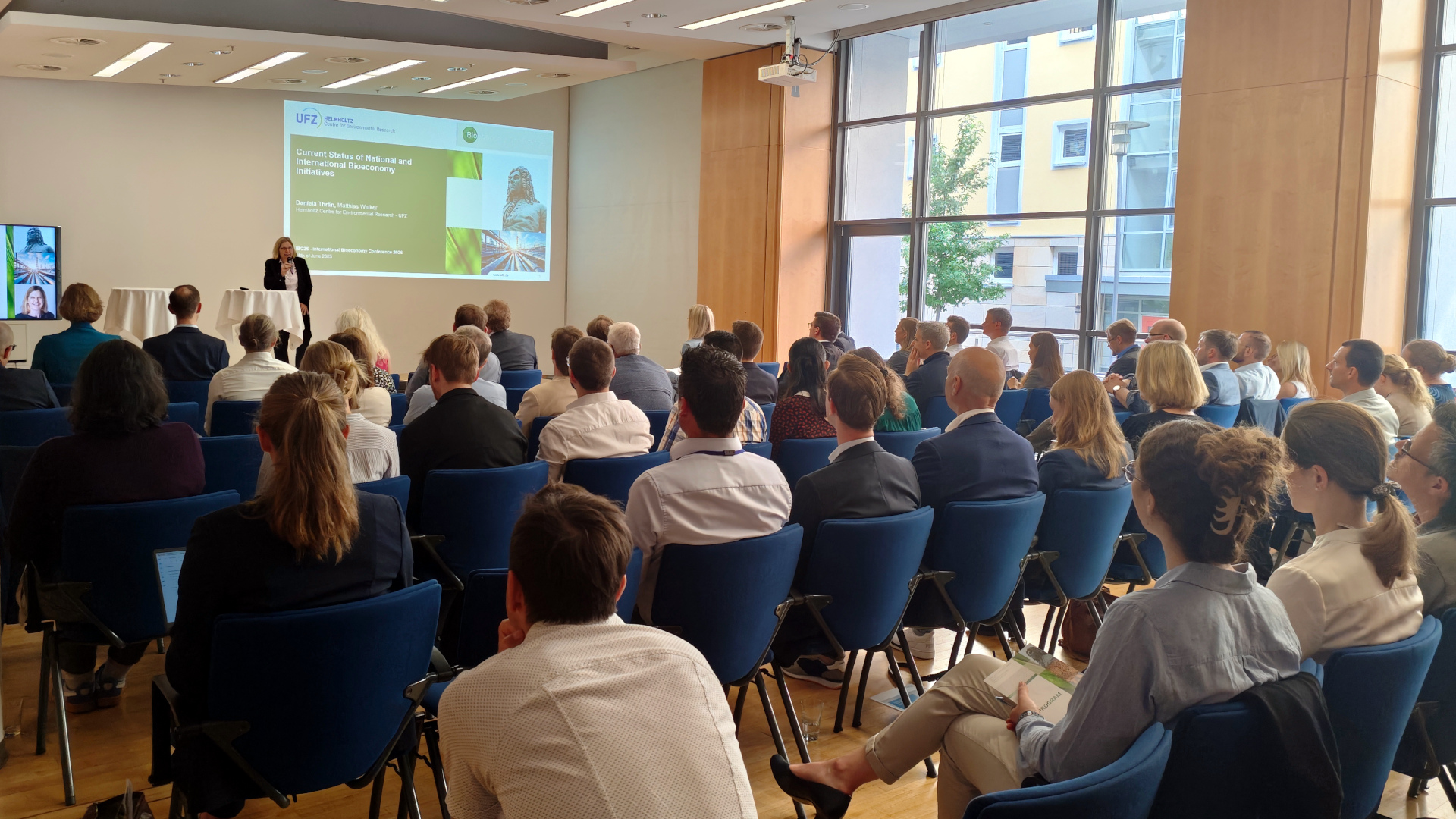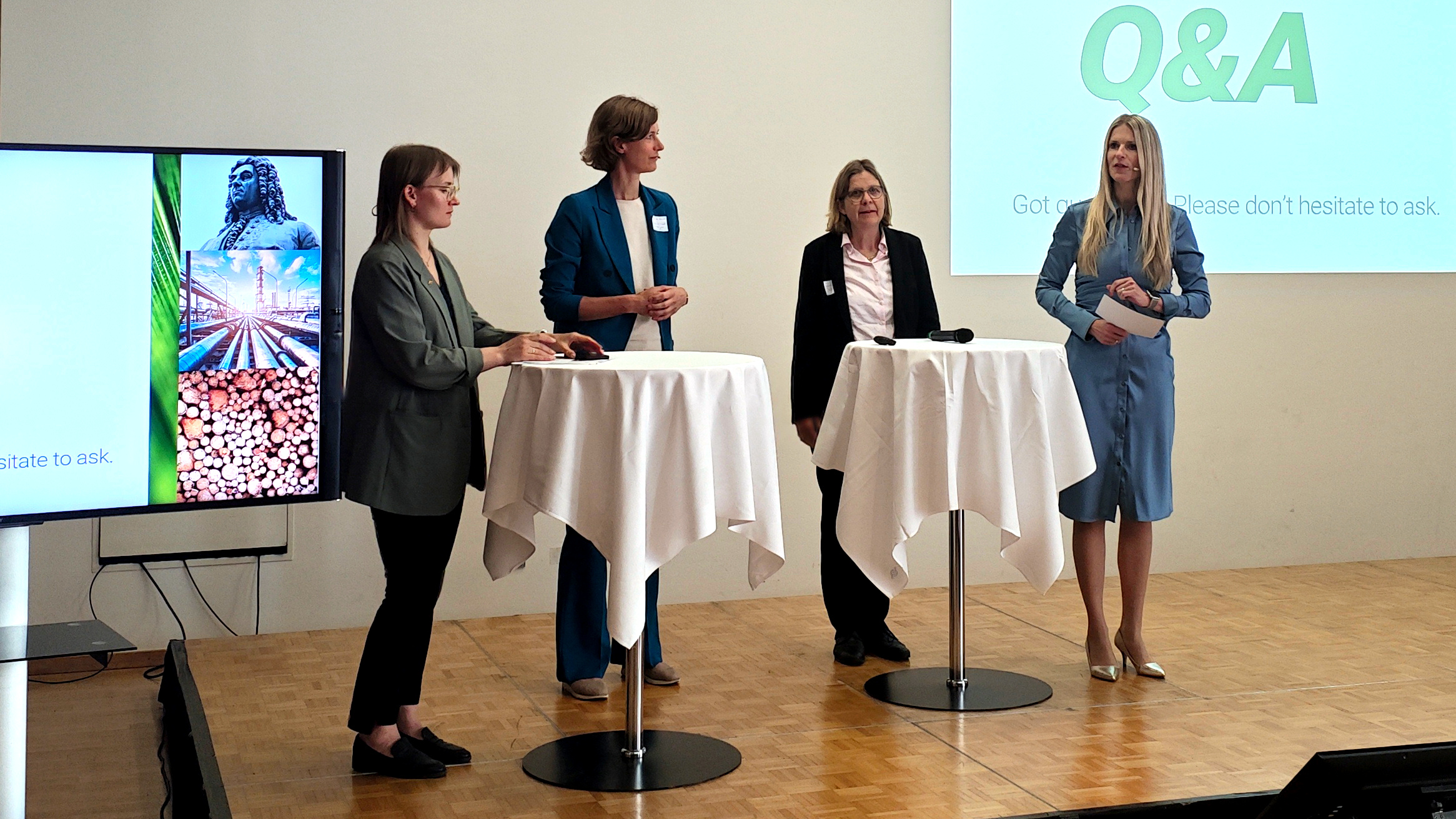Bioeconomy in a Shifting Global Landscape
At the 13th International Bioeconomy Conference in Halle, the spotlight was on the role of the bioeconomy in a world shaped by overlapping crises and evolving geopolitical priorities. In a global economy that is increasingly fragile, companies are under pressure to future-proof their operations - while also confronting the complexities of transitioning away from fossil-based systems.

Joachim Schulze, Vorstandsvorsitzender von eröffnete die Konferenz mit einem Appell an Zusammenarbeit und Offenheit: „Auf dieser Veranstaltung geht es ums Vernetzen, den Austausch – und darum, die Bioökonomie konsequent weiter voranzubringen,“ sagte er in seinen einleitenden Worten.
Das erste Panel rückte die politischen Rahmenbedingungen in den Fokus. Daniela Thrän, Leiterin des Departments Bioenergie am Helmholtz-Zentrum für Umweltforschung (UFZ), gab einen prägnanten Überblick über die sich rasant verändernde Landschaft bioökonomischer Strategien. „Wir erleben eine dynamische und vielfältige Entwicklung bioökonomischer Politiken weltweit“, stellte sie fest, bevor sie unterschiedliche politische Ausrichtungen in zentralen Ländern skizzierte.
Set against this backdrop, the conference - held from June 17 to 19 and organized by the local cluster BioEconomy e.V., - brought together around 100 international decision-makers from industry, innovative start-up founders, scientists, and policymakers. The central question: How can the bioeconomy maintain momentum in a time when political support for sustainability is fluctuating?
Joachim Schulze, Chairman of the BioEconomy e.V. cluster, opened the event by welcoming participants and emphasizing the importance of dialogue and collaboration. “This is a space to connect, to exchange ideas - and most importantly, to keep pushing the bioeconomy forward,” he noted in his opening remarks.
The conference’s first panel turned the spotlight on political frameworks. Daniela Thrän, Head of the Department of Bioenergy at the Helmholtz Centre for Environmental Research (UFZ), offered a sharp overview of the rapidly evolving global landscape of bioeconomy policies. “We’re witnessing a dynamic and diverse development of bioeconomy strategies around the world,” she observed, before outlining contrasting policy directions in key countries. The United States, once a vocal supporter of bio-based innovation, has recently reversed course, stepping back from earlier bioeconomy commitments. In contrast, China’s current Five-Year Plan assigns a prominent role to the bio-based industry, biotechnology, and related fields. The country is positioning itself to become a global leader in biotechnology, Thrän noted, outlining how the world's second-largest economy is doubling down on the sector’s strategic value. Meanwhile, Brazil has likewise taken a significant step forward: in 2024, the country launched its first national bioeconomy strategy. The South-American country aims to mobilize at least €10 billion in public-private investment for ecosystem restoration and bioeconomy projects.
At the multilateral level, the G20 agreed last year on non-binding high-level principles for the bioeconomy - a move seen as largely symbolic but directionally important. Within the EU, change is also underway. The European Commission plans to revise its bioeconomy strategy and align it with the goals of broader competitiveness frameworks. Yet, as Thrän pointed out, Europe still struggles with fragmented visions: “These diverging approaches are a barrier to implementation. A more coherent European strategy is essential.”
Janine van Kampen, Policy Advisor at the Dutch Ministry for Climate and Energy Policy, shared insights into the approach of the Netherlands, which is marked by strong institutional support for structural transitions toward a bio-based economy. From a different angle, Inga Rovbutas, Commercial Attaché at the Lithuanian Embassy, presented Lithuania as a country with a strong research infrastructure in place, yet still in the early phases of formal policy development for the bioeconomy.
A Shifting Global Context
In the following Q&A session, the panelists discussed the implications of the US policy shift. Would this retreat weaken the global momentum of the bioeconomy world-wide? Van Kampen disagreed: “Quite the opposite. We’re seeing renewed commitment in Europe and beyond. Strategic autonomy is on everyone’s lips, especially in the EU - and bioeconomy is increasingly recognized as a tool for resilience, competitiveness, and geopolitical independence.”

When it came to identifying the most effective levers for accelerating bioeconomic transformation, panelists stressed that clear regulatory frameworks can drive demand for bio-based materials and sustainable practices across industries. Everyone in this industry is aware that there is no green premium, Joachim Schulze emphasized. The panelists agreed that what is truly needed are innovations that can compete with conventional products. They also highlighted the importance of creating market pull in addition to technological readiness.
Investment, Innovation, and Industrial Momentum: Financing the bioeconomy
In a session on financing, Annika Bülow of the market research firm Ceresana noted that while the market share of bio-based products is growing, it remains relatively small. Albrecht Läufer introduced SEF Ventures, a recently launched VC dealing in sustainability and currently in the fundraising phase. He emphasized that the current fundraising climate is extremely challenging. "Only disruptive technologies with the potential for rapid scalability are likely to attract investors," he said. However, the biggest hurdle lies elsewhere: "Exit potential is the biggest challenge in the VC business," Läufer stressed.
However, he also highlighted a window of opportunity that is opening up over the next five to ten years for piloting and scaling new, more efficient technology - as long as the EU stays committed to its objective of having its industry effectively climate-neutral by 2040. In the following session, which focused on industrial perspectives, representatives from companies such as Neste, UPM Biochemicals, Verbio, VORN Bioenergy, and others discussed how they plan to capitalize on this window of opportunity. They also addressed strategies for navigating the notorious “Valley of Death” - the critical funding gap between early-stage development and commercial scale-up, where many bio-based innovations fail due to a lack of investment needed to move beyond the lab or pilot phase into commercial production.
The atmosphere at the Georg-Friedrich-Händel-Halle, where the event took place, was both optimistic and familiar. The key players in the region - known for its strong industrial and chemical heritage and its transformation into a dynamic bioeconomy hub - form a well-established and effective network. With major investments and infrastructure, such as the biorefinery research center in Leuna, the region continues to strengthen its position as a model for sustainable and circular bioeconomy innovation. The event is set to return in two years, continuing the dialogue and momentum around bio-based transformation in Middle Germany and beyond.
um


